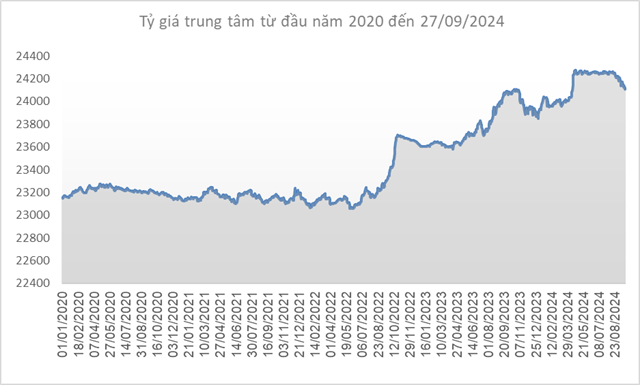The State Bank of Vietnam (SBV) reported impressive growth in cashless payments and a significant shift towards digital transactions in the country. In its report to the National Assembly, the SBV highlighted the continuous improvement of the legal framework and policies governing payment activities, which has accelerated digital transformation and promoted cashless payments. The SBV has played a pivotal role in this development by researching, issuing, and implementing crucial policies.

Illustrative image
Robust Growth in Cashless Payments
With enhancements in the legal framework, the banking industry has witnessed a vigorous digital transformation. Cashless transactions have flourished, and digital channels have become increasingly popular among users. According to SBV statistics, compared to the same period in 2023, cashless transactions increased by 56.68% in volume and 32.79% in value in 2024. Internet banking transactions rose by 49.73% in volume and 33.12% in value, while mobile banking transactions grew by 54.08% in volume and 34.03% in value. Notably, QR code payments witnessed a remarkable surge, increasing by 104.65% in volume and 97.14% in value.
As of the end of 2024, the total number of registered and active Mobile Money accounts stood at 10.2 million, with over 7.3 million accounts registered in rural and mountainous areas, accounting for approximately 72% of the total registered and active accounts.
The proliferation of online payment channels has effectively shifted people’s habits away from cash transactions. ATM transactions continued to decline, dropping by 12.83% in volume and 4.49% in value, indicating a decreasing preference for cash withdrawals. This trend further emphasizes the growing adoption of cashless payment methods and digital habits.
The SBV reported that, in the first two months of 2025 compared to the same period in 2024, cashless transactions increased by 41.28% in volume and 21.91% in value. Internet banking transactions rose by 35.81% in volume and 29.69% in value, while mobile banking transactions grew by 35.13% in volume and 18.63% in value. Notably, QR code payments witnessed a significant surge, increasing by 75.54% in volume and a substantial 196.62% in value.
Biometric authentication, introduced in December 2023 and made effective from July 2024, has proven to be a significant enhancement. Over 108 million customer records have been collected and cross-referenced with biometric data, ensuring secure transactions and reducing incidents of fraud. Additionally, the SBV issued Circular No. 50/2024/TT-NHNN, effective from January 1, 2025, to strengthen information security and protect online payment services and other online banking services.
The implementation of biometric banking has received widespread support from individuals, organizations, and businesses. Credit institutions and payment intermediaries have been proactive in adopting the National Digital Transformation Program’s Proposal 06, which focuses on the development and application of population data, e-identification, and electronic authentication to facilitate digital transformation.
As of April 11, 2025, the banking industry has cross-referenced over 108 million customer records (CIFs) with biometric data from chip-enabled citizen identification cards or VneID accounts (covering over 92% of individual payment accounts transacting digitally). Moreover, over 530,000 organizational customer records have been cross-referenced with biometric data (representing 41% of organizational payment accounts transacting digitally). Approximately 20.9 million e-wallet users have had their biometric data collected and cross-referenced with chip-enabled citizen identification cards through e-wallet applications (covering 73.15% of active e-wallets).
Effective Implementation of the Cashless Payment Development Proposal and the Banking Industry Digital Transformation Plan
To combat high-tech crimes in the banking sector, the SBV has been proactive in monitoring and guiding payment service providers and payment intermediaries. These entities have been instructed to strengthen customer identification and authentication processes for e-wallet openings and usage, preventing the use of fake documents and curbing the rental or lending of e-wallets. They have also been directed to enhance monitoring and control mechanisms to detect suspicious transactions and prevent the use of e-wallets for illegal activities. Additionally, there has been a push for increased investment in infrastructure and the adoption of advanced payment technologies and international security standards for information systems.
The SBV has maintained close coordination with relevant authorities in combating high-tech crimes and ensuring information security. Joint efforts include specialized inspections, information security incident response drills, information security expert training, and investigations to apprehend high-tech criminals involved in banking-related activities.
Despite these efforts, challenges remain. Concerns about the security of electronic and online payment methods persist, and the infrastructure for payment services remains concentrated in urban areas, with limited coverage in rural and remote regions. Additionally, there are legal challenges regarding the implementation of payment agency activities, which require time and guidance to ensure safe and effective operations.
Preventing high-tech crimes in electronic payments also faces obstacles due to the increasingly sophisticated nature of such crimes. Criminals are employing complex and rapidly evolving tactics, and illegal activities such as gambling, fraud, commercial fraud, tax evasion, drug trafficking, and prostitution are on the rise. As the banking sector is only responsible for the final transaction in a series of goods or service purchases, it is challenging to determine the legality of the underlying goods or services promptly. Effective prevention and combating of high-tech crimes in this context require close collaboration and timely information sharing among relevant ministries and sectors.
Moving forward, the SBV is committed to effectively implementing the Proposal for Developing Cashless Payments in Vietnam for the 2021-2025 period and the Banking Industry Digital Transformation Plan. Efforts will focus on promoting digital transformation, cashless payments, and ensuring security, safety, and confidentiality in banking activities. The SBV will also explore new payment models and cross-border payment technologies.
Additionally, the SBV will enhance the monitoring of critical payment systems, providing timely warnings and recommendations to mitigate risks. It will also promote initiatives to strengthen electronic payment security and safeguard the information systems of the banking industry, ultimately protecting the legitimate rights and interests of customers.
Furthermore, the SBV will intensify its information dissemination campaigns, raising public awareness about payment policies, digital transformation, and financial management skills. These initiatives aim to empower individuals to make safe and effective use of banking products and services.
“Vietnam Airlines and FPT: Forging Ahead with Next-Gen Aviation Technology”
Vietnam Airlines and FPT have joined forces, signing a comprehensive strategic cooperation agreement with a shared vision of digital transformation. This partnership aims to enhance operational capabilities and optimize the customer experience through innovative solutions. With FPT’s expertise in technology and Vietnam Airlines’ commitment to excellence, this collaboration is set to revolutionize the industry, taking both companies to new heights.
The Ultimate Guide to Online Doormat Sales: How Three Entrepreneurs Navigated Village Traditions to Tap into the Digital Market
The story of Thân Vui straw mats and the centuries-old craft of the village came to life online, despite initial hesitance and the challenge of shipping bulky items. With a presence on TikTok Shop, the artisans, who grew up amidst the straw, have overcome exploitation by traders, fulfilling over 30,000 orders and selling 200,000 mats annually.
“Empowering Vietnamese Enterprises: Marching Alongside the Nation’s Private Sector Development”
Aiming for the Government’s targeted GDP growth rate of 8%, Resolution No. 68-NQ/TW positions the private sector as the central driving force of the economy. Masan (HoSE: MSN) is expected to be one of the exemplary consumer-retail businesses, actualizing this orientation through its strategy of developing domestic value chains.
“A Bright Start: PJICO’s Impressive Performance in Q1”
In the recently released Q1 2025 financial report, Petrolimex Insurance Joint-Stock Corporation (PJICO, code: PGI) recorded a total revenue of VND 1,343 billion, a 3.3% increase, amounting to 26% of the yearly plan. The original insurance revenue reached VND 1,114 billion, a slight 1.3% uptick compared to the same period in 2024.
“FinanceAsia: SHB is Vietnam’s ‘Best Bank for Public Sector Clients’ in 2025”
Within the prestigious FinanceAsia Awards 2025, the Saigon-Hanoi Commercial Joint Stock Bank (SHB) has been recognized as the “Best Bank for Public Sector Clients” in Vietnam. This esteemed accolade celebrates SHB’s unwavering dedication to offering comprehensive and efficient financial solutions to public sector entities, standing as a testament to their commitment to fostering the country’s sustainable development.





















